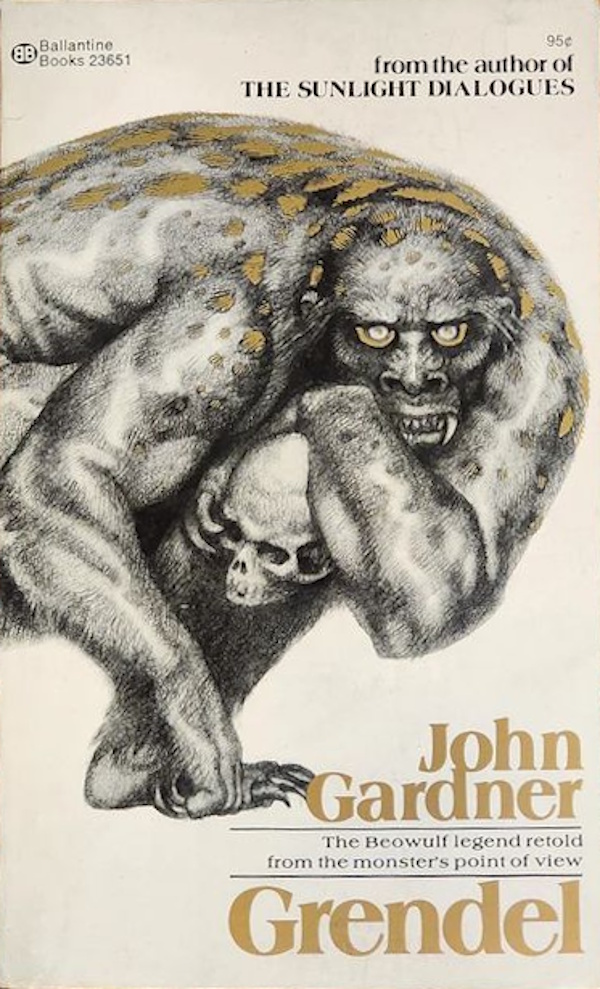Grendel
 |
 |
 |
 |
 |

- Publication Date: 1971
- Written by: John Gardner
- Illustrated by: Emil Antonucci
- Page count: 152
When I bought my copy of Beowulf from my local bookstore, I found a copy of John Gardner's Grendel just a few shelves down the same aisle. I picked it up because I recognized the name of the character, and when I saw that the cover proclaimed it to be "The Beowulf legend retold from the monster's point of view," I figured it would be a perfect follow-up to the original poem. While it may not be as historically significant as one of the oldest works in English literature, Grendel provides an entirely new perspective on the story that acts as the perfect counterbalance to the original work.
In Beowulf, there wasn't a whole lot to Grendel when it came to character development. In the handful of scenes that he appeared in, he was nothing more than a monster to be beaten by the hero, with extremely vague characterization that painted him simply as a bloodthirsty monster who was born and destined to be evil. In a poem, vague characterization works for figures like that because they act more as archetypes than actual characters, and that leaves plenty of room for other storytellers to fill in the blanks with their own interpretations of how they came to be. Gardner's novel details Grendel's initial wanderings into the wider world, his motivations for launching his twelve-year assault on Hrothgar's kingdom, and his mental spiral as he descends further into bloodlust and existential dread. While it may not be a poem, its writing style makes heavy use of simile and metaphor that evokes the same sort of poetic style, especially when it's read aloud. If Beowulf was meant to be the grand send-up of the perfect hero figure, Grendel is the biting condemnation of the world from a downtrodden reject. A lot of it reads like the "nobody understands me" musings of an angsty teenager, but with a lot more malice and a dash of sarcasm thrown in for good measure. You can get a good feeling of how Grendel perceives himself on just the second page of the book:
"Not, of course, that I fool myself with thoughts that I'm more noble. Pointless, ridiculous monster crouched in the shadows, stinking of dead men, murdered children, martyred cows. (I am neither proud nor ashamed, understand. One more dull victim, leering at seasons that never were meant to be observed.) 'Ah, sad one, poor old freak!' I cry, and hug myself, and laugh, letting out salt tears, he he! Till I fall down gasping and sobbing. (It's mostly fake.)"
What I really appreciated about this book is that it didn't try to make Grendel truly sympathetic or misunderstood. At no point is he a purely good character who is forced to become evil due to something beyond his control. As the story begins, he is already talking about how disgusting and dumb the other inhabitants of the world are, and how he perceives himself to be superior to everyone around him. His true descent into villainy is almost entirely spite-driven, motivated by his observations that people can be emotionally manipulated by poetry to believe fiction as fact. To illustrate this, Gardner uses small excerpts from Beowulf as the songs of a bard that Grendel overhears, and these songs cause him to feel confusion and emotional turmoil that he doesn't understand. Thematically, this is a fantastic way of incorporating the original work while also turning it completely on its head. For example, Beowulf explicitly mentioned that Grendel was of a race that was descended from Cain. Here, when the bard tells the people of the conflict between Cain and Abel, Grendel initially assumes that he truly is of this race because he can't comprehend the emotions that the poetry makes him feel. This eventually leads him to a simple conclusion: why shouldn't he just be the monster that people say he is? If the world really is made up of idiots who can be manipulated by words and songs, why shouldn't he torment them for his own amusement? Grendel is evil just because he can be, and it's to his advantage to torment the people who never gave him a chance. I think a lot of modern-day villain stories make the mistake of turning them into misunderstood people who would have turned out differently if their circumstances had been better, so it's pretty refreshing to read a story of a villain who is evil just because they feel like doing so.
Grendel's increasing spite at the world is largely what propels the plot along, and for a bulk of the book, this makes for a pretty fun romp. My favorite arc has to do with the treatment of the hero Unferth, who was briefly mentioned in Beowulf. Grendel first encounters him when he is a young man, eager to prove himself in battle when Grendel attacks Hrothgar's mead-hall. Grendel easily has the upper hand, and rather than kill Unferth, he just humiliates him and lets him live. Unferth follows Grendel to his cave in an attempt to achieve a heroic death, but Grendel once again spares him. Over the next twelve years, he constantly denies him a victory in battle after battle, leading Unferth to constantly feel embarrassment and shame among his fellow warriors. Moments like this show how Grendel's view of the world has changed from something to be destroyed to something to be toyed with and tormented, and it fits perfectly with his "Why should I not?" motivations.
As fun as it is to read about Grendel relishing in how evil he is, the book does lose some of its momentum at a certain point. There's a pretty significant change in prose style once Grendel has been a full-on villain for twelve years. It tends to wander off into philosophical musings or bits of poetry, and in a confusing twist, Grendel narrates a few sections from the perspectives of other characters. A few chapters have him simply observing other characters and describing what they are up to, and while this does provide some backstory for other Beowulf characters, the pacing is significantly slower than the steady buildup of the previous ones. At the same time, these more contemplative chapters do work to show how numb Grendel has become to violence and destruction, as if sinking to the level of a monster still hasn't given him a satisfactory purpose for living. It's all very well-written, but I found myself taking the last third of the book in smaller chunks compared to how quickly I read the earlier parts. It's not until his ultimate confrontation with Beowulf when the furor of the early chapters returns to pick up the pace. The final battle is vicious and satisfying, and is reinterpreted in a way to show that the violence and carelessness that first gave Grendel his purpose in life has caused his downfall. Even as he nears his end, he never has a moment of regret or contemplation, spitting on the world around him as he draws his dying breath. It packs a real punch, and for a story revolving around such a purely evil character, I don't think you can get a more fitting conclusion than that.
While I really enjoyed Beowulf for its place in history, I do think that Grendel is the superior story. It's darker in tone, more philosophically complex, and much richer in character development and motivations. At the same time, it complements the original work so well that I would recommend anyone to read the two back-to-back. A perfect hero has to have a perfect villain, and if you want a compelling story of a monster that is unapologetically evil to their core, this is definitely one to check out.



